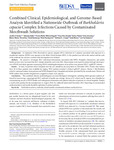2022-03-09Zeitschriftenartikel
Combined Clinical, Epidemiological, and Genome-Based Analysis Identified a Nationwide Outbreak of Burkholderia cepacia Complex Infections Caused by Contaminated Mouthwash Solutions
Bender, Jennifer K.
Haller, Sebastian
Pfeifer, Yvonne
Hogardt, Michael
Hunfeld, Klaus-Peter
Thürmer, Andrea
Zanuzdana, Arina
Werner, Markus
Kunz, Bernd
Eisenberger, David
Pfennigwerth, Niels
Kempf, Volkhard A. J.
Werner, Guido
Eckmanns, Tim
Background:
In September 2018, Burkholderia cepacia complex (BCC) infections in 3 patients associated with exposure to a mouthwash solution (MWS) were reported to the Robert Koch Institute (RKI). As the product was still on the market and the scale of the outbreak was unclear, a nation-wide investigation was initiated.
Methods:
We aimed to investigate BCC infections/colonizations associated with MWS. Hospitals, laboratories, and public health services were informed that BCC isolates should be sent to the RKI. These isolates were typed by pulsed-field gel electrophoresis (PFGE) and whole-genome sequencing (WGS) including development of an ad hoc core genome MLST (cgMLST) scheme.
Results:
In total, 36 patients from 6 hospitals met the case definition, the last patient in November 2018. Twenty-nine isolates from 26 of these patients were available for typing. WGS analysis revealed 2 distinct cgMLST clusters. Cluster 1 (Burkholderia arboris) contained isolates from patients and MWS obtained from 4 hospitals and isolates provided by the manufacturer. Patient and MWS isolates from another hospital were assigned to cluster 2 (B. cepacia).
Conclusions:
The combined clinical, epidemiological, and microbiological investigation, including whole-genome analysis, allowed for uncovering a supraregional BCC outbreak in health care settings. Strains of B. arboris and B. cepacia were identified as contaminating species of MWS bottles and subsequent colonization and putative infection of patients in several hospitals. Despite a recall of the product by the manufacturer in August 2018, the outbreak lasted until December 2018. Reporting of contaminated medical products and recalls should be optimized to protect patients.
Files in this item

